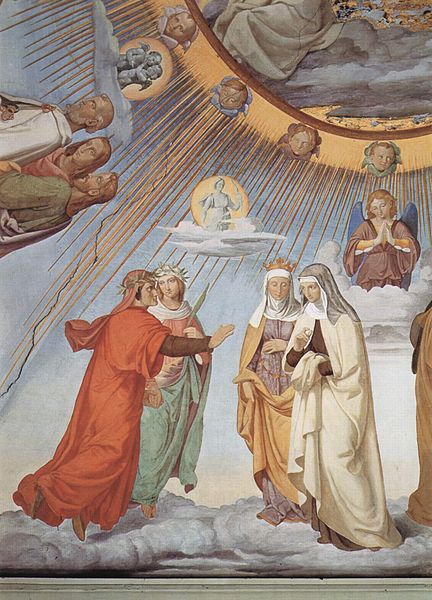
Illustration by William Doré
Plutus (not to be confused with Pluto) was the Greek god of wealth, and the son of Demeter and Iasion. The playwright Aristophanes depicted him as having been blinded by Zeus so he could distribute wealth without prejudice. Plutus is also depicted as lame (since he takes his time arriving) and winged (so he can leave quicker than he arrived). In the eponymous play Plutus, by Aristophanes, chaos erupts when his eyesight is restored.
On Grecian ceramics, Plutus (often a baby or child) bears a cornucopia, and in bas-reliefs, he’s shown as a little boy or baby in Eirene or Tyche’s arms.
In The Divine Comedy, Plutus guards the Fourth Circle of Hell (misers and spendthrifts). Since he was the god of wealth, Dante must’ve wanted him to symbolize the evils of using money in the wrong way.
Plutus is the Latin form of Ploutos, which means “wealth.”

Dante and Beatrice speaking to Piccarda Donati and Queen Constance of Sicily, as painted by Philipp Veit
Piccarda Donati was the sister of Corso and Forese Donati, and the first person whom Dante meets in Paradise. She resides in the Sphere of the Moon, Paradise’s lowest sphere, on account of ignored vows. Piccarda was a nun who was forcibly removed from her convent (the Poor Clares) by her brother Corso around 1288. Her dastardly brother forced her to marry Rosselino della Tosa, a Florentine noble from the Black Guelphs, to increase the family’s political interests. Shortly after the forced wedding, she died.
Piccarda and Dante knew one another in life, as Dante was friends with her other brother Forese. However, Dante doesn’t immediately recognize her, since she’s become much more beautiful than she was on Earth. Piccarda explains this happens to all souls in Paradise; because of this, Piccarda is the only person Dante recognizes without prompting.
Dante asks her if she doesn’t aspire to a higher sphere, so she might see more of Paradise, or to make herself more belovèd. Piccarda responds by saying souls in Paradise only want what they have, and are completely in agreement with the will of God. Even though they know other people have been placed in higher spheres, they’re happy with their own lot.
Piccarda is a Medieval Italian name which possibly means “from Picardy” (a region in France).


That sounds like a lesson we can all learn: “Even though they know other people have been placed in higher spheres, they’re happy with their own lot.”
Thanks for sharing, as always!
Pingback: A to Z Reflections 2016 | Onomastics Outside the Box